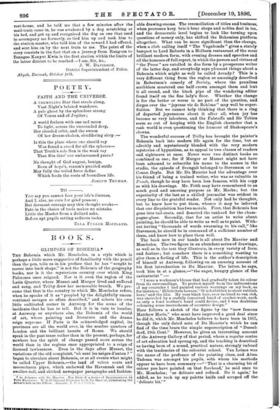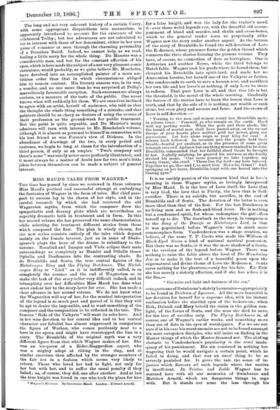BOOKS.
GLIMPSES OF BOHEMIA.* THE Bohemia which Mr. Moscheles, in a style which is perhaps a little more suggestive of familiarity with the pencil than the pen, tells us in his preface that he has "sought to coerce into book shape," is not the Bohemia of the geography books, nor is it the mysterious country over which King Polizenes once reigned. Nor is it even the region of the Latin Quarter. where Musset and Murger lived and suffered and sang, and Trilby drew her memorable breath. We pre- sume that that is the country to which Mr. Moscheles refers, when he speaks of it as "peopled by the delightfully uncon- ventional savages so often described," and selects his own little cultivated corner in Antwerp for the scene of the incidents that he has to tell. But it is in vain to localise, at Antwerp or anywhere else, the Bohemia of the world of art, where painting and literature and the drama reign supreme. If Paris is its acknowledged capita], its provinces are all the world over, in the sombre quarters of London and the brilliant haunts of Rome. We should speak in the past tense rather than in the present, perhaps, for nowhere has the spirit of change passed more across the world than in the regions once appropriated to a reign of licensed lawlessness. Even in the days after Musset, the variations of the old complaint, "oil sont les neiges d'antan ? " began to circulate about Bohemia, or at all events what might be called Upper Bohemia,—the land of velvet coats and meerschaum pipes, which eschewed the Havannah and the swallow-tail, and shirked newspaper paragraphs and fashion- • In Bohemia with Du Maurier. The First (4 a Series of Reminiscences by Felix Moscheles, W.th 63 Original Drassinws by G. Du Maur:sr, Illustrating the Artist's Life in the Fifties. Loudon: T. Fi-b r Unwin. able drawing-rooms. The reconciliation of titles and business, when peeresses keep bric-h-brac shops and nobles deal in tea,, and the democratic level begins to look like turning upon questions of money only, has shifted the Bohemian platform. altogether. What can be more significant than the change, when a club calling itself "The Vagabonds" gives a stately banquet to Lord Roberts in a Holborn restaurant of the most
brilliant modern form, with evening dresses and speeches and all the honours of full report, in which the powers and virtues of "the Press" are extolled in due form by a prosperous writer of the latter day, and everybody says pleasant things about a Bohemia which might as well be called Arcady ? This is a very different thing from the region so amusingly described in Robertson's comedy of Society, where the penniless scribblers mustered one half. crown amongst them and lent it all round, and the black pipe of the wandering editor found itself on the fine lady's floor. Whether the change is for the better or worse is no part of the question, and dirges over the "joyeuse vie de Boheme " may well be super- fluities. But we cannot help thinking that there is a ring of departed joyousness about it after all, when joy has
become so very laborious, and the Falstaffs and Sir Tobies seem so out of keeping with the English character that a rash world is even questioning the humour of Shakespeare's
clowns.
The wonderful success of Trilby has brought the painter's Bohemia back into modern life again for the time, but so adroitly and mysteriously blended with the very modern mysteries of hypnotism, as to appeal to two classes of readers and sightseers at once. Never were two distinct books so combined m one; for if Murger or Musset might not have been ashamed to subscribe his name to the scenes in the studio, the episode of Svengali belonged to Stevenson or to Conan Doyle. But Mr. Du Maurier had the advantage over his friend of being a trained writer, who was as valuable to Punch, though he may have been less famous, with his copy as with his drawings. Mr. Frith may have remembered to as much good and amusing purpose as Mr. Marks ; but the superiority of the last as a skilled journalist was evident in every line to the grateful reader. Not only had he thoughts, but he knew how to put them, whence it may be inferred that our disquisition has two morals. First, that Bohemia has gone into tail-coats, and deserted the tankard for the cham- pagne-glass. Secondly, that for an artist to write about painting, he should be able to write as well as to paint. With- out having "thousands of words swarming to his call," like Stevenson, he should be in command of a sufficient number of them, and know how to place them well.
The book now in our hands is all about Da Manlier and Moscheles. The two figure in an abundant series of drawings,.
as well as in the text they illustrate, in every variety of form,
and feature ; but somehow there is a something wanting to give them a feeling of life. This is the author's description of himself at Antwerp, following on an amusing account of his first introduction to Du Manner. The latter, he says, took him in at a glance,—" the eager, hungry glance of the
caricaturist" :—
" I wore a workman's blouse that had gradually taken its colour from its surroundings. To protect myself from the indiscretions of my comrades I had painted various warnings on my back, as for instance, Billstickers beware," It is forbidden to shoot rubbish: here,' and the like. My very black hair, ever inclined to run riot, was encircled by a craftily conceived band of crochet-work, such,.
• as only a fond mother's hand could devise, and I was doubtless colouring some meerschaum of eccentric design."
Here follows a sketch of the figure by the "now famous Matthew Marie," who must have improved a good deal since he did it, which Mr. Moscheles believes to have been in 1857; though the only dated note of Du Maurier's which he can find of the time bears the simple superscription of "Dussel- dorf, 19th Cent." However, he gives an interesting account of the Antwerp Gallery of that period, where a regular centre
of art education had sprung up, and the teaching is described as having been of a sound, practical nature, strongly imbued with the tendencies of the colourist school. Van Leines was the name of the professor of the painting class, and Alma, Tadema was amongst his pupils, with whom his methods appear to have been summary :—" That is a charming bit of colour you have painted on that forehead,' he said once to Mr. Moscheles; so delicate and refined. Do it again,' he added, as he took up my palette knife and scraped off the delicate bit.'" The long and not very coherent history of a certain Carry, with some appropriate disquisitions into mesmerism, is apparently introduced to account for the existence of the celebrated Trilby ; but her adventures are not calculated to vie in interest with those of her descendant, either in her own guise of romance or seen through the charming personality of a Dorothea. Baird. Indeed, we cannot help. as we read, feeling a little sorry for the whole thing. Du Meunier was a considerable man, and but for the constant affection of his eyes, which is here made the subject of a not very pleasant comic caricature, would probably, as we quite believe Mr. Moscheles, have devolved into an accomplished painter of a more am- bitious order than that in which circumstances obliged him to remain content. His literary Emcees was, in its way, a wonder, and no one more than he was surprised at Trilby's marvellously favourable reception. Such successes are always curious, as a measure of the taste of the public. One never knows what will suddenly hit them. We are ourselves inclined to agree with an artist, herself of eminence, who told us that she thought the whole thing something of a mistake, and that painters should be as chary as doctors of using the arcana of their profession as the ground-work for public treatment. But the point is quite arguable, and Da Manner's many admirers will turn with interest to Mr. Moscheles's volume, although it is almost as personal to himself in connection with his lost friend as was Forster's view of Dickens. In the abundance of drawings of the two, in every period and costume, we begin to long at times for the introduction of a third person, if only as an umpire. "Two's company and three's none" was surely never more profusely illustrated; and it must always be a matter of doubt how far two men's little jokes between themselves can be made a subject of general interest.











































 Previous page
Previous page